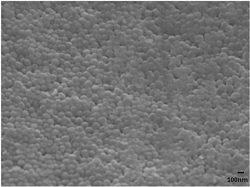 |
| "Magic bullet" nanoparticles target inflammation in the lungs.--Courtesy of Queen's University Belfast |
A new nanoparticle drug-delivery platform created by researchers at Queen's University Belfast may be able to target and effectively treat severe lung trauma in patients in intensive care.
Acute lung injury is mainly caused by traffic accidents and infection, and affects about 20% of all patients in intensive care. While the current standard of care for acute lung injury involves a volume-controlled method to improve oxygen intake that can cause a lot of discomfort to patients, the new "magic bullet" platform targets inflammation directly once inhaled, according to a release from the university.
The nanoparticle's surface recognizes and binds to the lungs' immune cells, which are the cause of the inflammation. By binding to these cells, the treatment reduces their presence and brings down inflammation to prevent the damaging effects it can have on the respiratory system.
"Nanoparticles are perhaps one of the most exciting new approaches to drug development," lead researcher Chris Scott said in a release. "Most research in the area focuses on how the delivery of drugs to the disease site can be improved in these minute carriers. Our own research in this area focuses on how nanoparticles interact with cells and how this can be exploited to produce therapeutic effects both in respiratory disease and cancer."
The Northern Irish scientists hope to introduce the platform in the clinic in the next three years, aided by a grant from the Medical Research Council Developmental Pathway Funding Scheme.
- here's the release